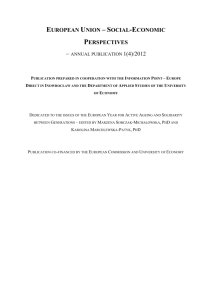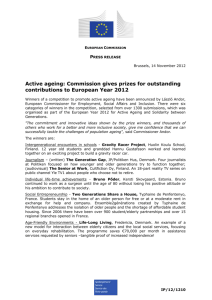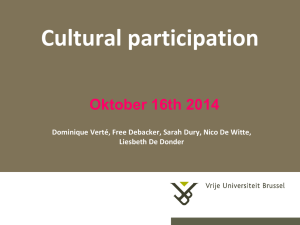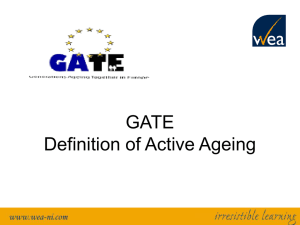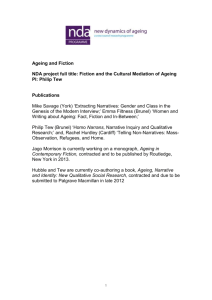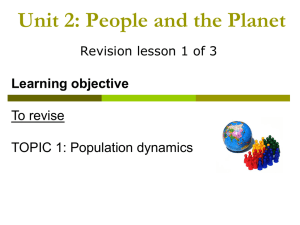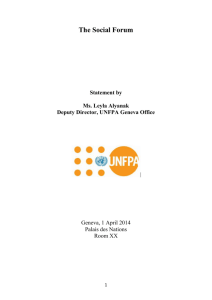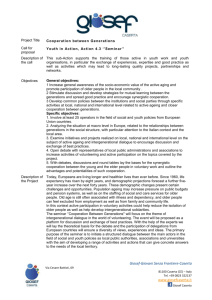Speech_ UNECE Conference_200912
advertisement
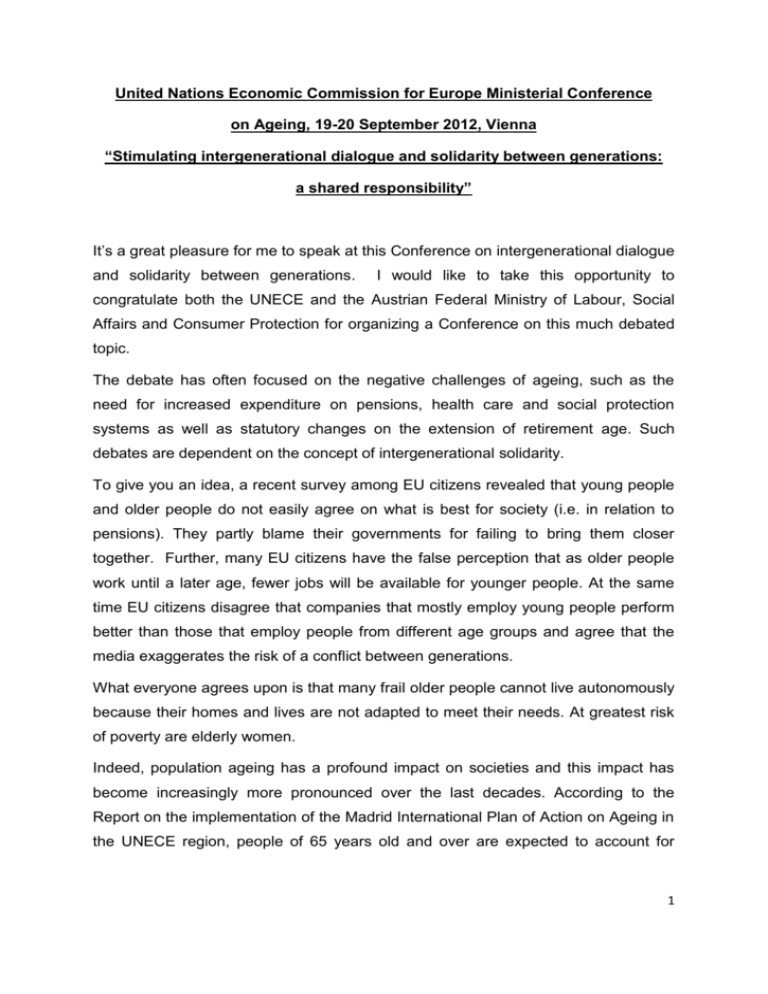
United Nations Economic Commission for Europe Ministerial Conference on Ageing, 19-20 September 2012, Vienna “Stimulating intergenerational dialogue and solidarity between generations: a shared responsibility” It’s a great pleasure for me to speak at this Conference on intergenerational dialogue and solidarity between generations. I would like to take this opportunity to congratulate both the UNECE and the Austrian Federal Ministry of Labour, Social Affairs and Consumer Protection for organizing a Conference on this much debated topic. The debate has often focused on the negative challenges of ageing, such as the need for increased expenditure on pensions, health care and social protection systems as well as statutory changes on the extension of retirement age. Such debates are dependent on the concept of intergenerational solidarity. To give you an idea, a recent survey among EU citizens revealed that young people and older people do not easily agree on what is best for society (i.e. in relation to pensions). They partly blame their governments for failing to bring them closer together. Further, many EU citizens have the false perception that as older people work until a later age, fewer jobs will be available for younger people. At the same time EU citizens disagree that companies that mostly employ young people perform better than those that employ people from different age groups and agree that the media exaggerates the risk of a conflict between generations. What everyone agrees upon is that many frail older people cannot live autonomously because their homes and lives are not adapted to meet their needs. At greatest risk of poverty are elderly women. Indeed, population ageing has a profound impact on societies and this impact has become increasingly more pronounced over the last decades. According to the Report on the implementation of the Madrid International Plan of Action on Ageing in the UNECE region, people of 65 years old and over are expected to account for 1 more than a fifth while those of 80 years old and above will make up more than 5 per cent of the total population by 2030. Therefore, while increasing longevity and decreasing birth rates have created a considerable number of challenges, they have also served to create a unique momentum to address and ensure intergenerational reciprocity and promote solidarity between generations. By being placed in the spotlight of political will, population ageing has created unique opportunities to promote societal participation, strengthen social cohesion and prevent discrimination, as well as integrate persons in vulnerable situations into society. Having said that, we need to acknowledge that there is no single policy response in dealing with the ageing of the population through solidarity between generations. One size does not fit all. The nature, scale and pace of demographic trends vary considerably from country to country and from region to region. Furthermore, we have to bear in mind that population ageing does not only affect older persons but also people of all ages and both sexes. The fact that individuals are embedded in a complex web of vertical and horizontal ties should be taken into account when designing policy responses. In this respect, the right policy mix is the shared responsibility of governments, social partners, enterprises, non-profit organizations and citizens of all ages to engage in meaningful dialogue, taking a cross-sectoral, intergenerational and life-course approach that takes both age and gender into account. They should step-up and coordinate efforts to create meaningful cohesion between generations. Areas in which all these stakeholders may step-up efforts are as follows: Fostering productive working and retirement lives and life-long learning through active policies which keep seniors active while investing in young people as well; Supporting the intergenerational exchange of skills and higher use of mentoring schemes in the working process; further development and adaptation on existing policies addressing the economic, employment-related challenges of demographic change will allow the economy to grow and help reduce youth 2 unemployment. In this context, it is important to ensure a balance between pension systems, employment policies and investments in youth. Promoting non-discrimination policies which encourage cooperation, including measures to eliminate stereotypes about the role of each generation in society, by raising awareness of the ageing process. Civil society cooperation is important in this respect as well as promoting positive images of older people in school curricula and media programmes. Reconciling work, family and private life through "family friendly" measures such as available and affordable care services for children, older persons and other family dependents. A more holistic approach towards the individual should be encouraged which takes into account the fact that active contribution to economic life is always linked with personal concerns for family, social and health matters. Actively promoting innovative assistive technologies and services that can help the elderly live independent, healthy and physically active lives. Working conditions need also be adapted to an actively ageing population. This will contribute towards changing policies that merely provide for older persons to policies of empowerment. Older persons should be able to take responsibility for their own quality of life and well-being. Taking into account the gender perspective when designing policies. Mainstreaming ageing and mainstreaming gender are interlinked. Equal intergenerational responsibilities throughout the working life of both men and women should be encouraged, by creating optimized conditions for the reconciliation of work and family life and preventing inequalities of social security in old age. Supporting associations and initiatives that foster stronger relations between young and older people at the local, regional and national levels. Promoting better relations between the young and the old through incorporating these issues into the curricula of all educational institutions. Creating opportunities for older people to volunteer for tasks that match their skills and wishes. 3 It is vital to invest in the human capital of all generations in order to ensure long-term economic growth and inclusive societies. We must ensure that policy measures and actions at both national and global level are consistent and mutually supportive, always taking into account that population ageing directly and indirectly affects people of all ages and both sexes. The Madrid International Plan of Action on Ageing and its Regional Implementation Strategy adopted in 2002 provided an excellent policy framework to direct the response to population ageing among UNECE member States. Based on this, important steps have been made and positive changes have occurred throughout the UNECE region, in spite of the fact that the second cycle of implementation has been marked by economic and social instability, due to the financial crisis in some parts of the region. In this context, measures that support social cohesion should form an integral part of our crisis response. Policies aimed at vulnerable groups are very relevant and necessary in these times, as they mitigate the effects of crisis and prepare for sustainable and balanced recovery. This year we are ready to reaffirm our commitment with the 2012 Vienna Ministerial declaration “Ensuring a Society for all ages: Promoting Quality of Life and Active Ageing”. This declaration will hopefully contribute to further awareness-raising and provide input that can be used in policy design on active ageing on the highest political level. 2012 was declared as the “European Year of Active Ageing and Solidarity between Generations”. In this direction, national, regional and local governments, civil society, employer and workers organizations have committed to specific actions and goals. In this context, one of the priorities of the Cyprus Presidency of the Council of the European Union, is promoting the active participation of older people in all aspects of the society, and the strengthening of solidarity between generations. The closing event of the year will be organized in Cyprus and we intend to promote the adoption of a Declaration, marking the end of the year and drawing on the experience gained from the actions of the year. Thank you for your attention. 4
